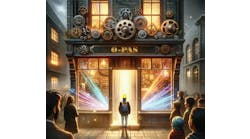Catch them while they’re young—and brainwash them during the holiday season. There’s lots of talk lately about the need to get more kids involved in engineering, science and mathematics. However, there’s also growing evidence that high school and junior high school may be too late to catch and hold the attention of many youngsters.
So, how can engineers and other supportive adults spark an interest in technical topics among the children in their families and communities? Well, since kids as they mature seem to gain more sophisticated sensors for avoiding being spoon-fed anything that might be useful, I’d suggest focusing on toddlers, kindergartners and everyone else under 10 to 12 years old. In any event, you’ll have to be sneaky whatever the ages of the kids you’re trying to reach.
The good news is that Thanksgiving, Hanukkah, Christmas, Kwanzaa and the other days off during the holiday season may give you some added time and chances to instill an appreciation of imaginative problem-solving stories and skills. I think this is the foundation on which all of a child’s future teachers can build that much-sought willingness to embrace technical disciplines. For kids, connecting with the larger world, including its technology and engineering, means first connecting with the people closest to them on a regular basis.
First, peel yourself and the kids away from the TV. Second, do as many special and mundane activities together with your kids, nieces and nephews, and anyone else that shows up. You know, clean house, bake cookies, build with Legos, etc. Third, once everyone has expended some physical energy, read stories aloud to each other, and do it often enough to become a habit. To assist, I’ve compiled a handy list of books that both process engineers and their young audiences should enjoy.
Strega Nona, by Tomie dePaola, is the story of a wise, old witch, who hires a young assistant, Big Anthony. He misapplies the batch controls for her magic pasta pot and triggers a runaway production process that floods their town with spaghetti. A classic process control snafu.
The Warrior and the Wise Man, by David Wiseniewski, tells about two sons of a Japanese emperor. One is a warrior who steals and unleashes a series of elemental forces. The other is a wise man, who appropriately reapplies these forces in succession to control each of the others to restore the kingdom’s equilibrium.
Perfect Pancakes If You Please, by William Wise and Richard Egielski, shows how King Felix offers his daughter’s hand in marriage to anyone who can make him perfect pancakes. This sets up a battle between an evil inventor, who creates a tsunami of pancakes, and a young scientist, who tries to mitigate this disaster.
Bartholomew and the Obbleck, by Dr. Seuss, tells the story of King Derwin, who foolishly calls down a rain of gooey green adhesive, and his pageboy, Bartholomew Cubbins, who struggles to save the kingdom.
Mike Mulligan and His Steam Shovel, by Virginia Lee Burton, details the career of a man and his legacy-technology shovel. After building much of the modern world, they’re cast aside, embark on a search for one last job and find a way to apply their old temperature and pressure capabilities in a new way.
Professor Puffendorf’s Secret Potions, by Robin Tzannes and Korky Paul, tells about a brilliant inventor, her deceitful assistant’s self-serving misuse of her chemical inventions and how her loyal hamster turns the tables.
Charlie and the Chocolate Factory, by Roald Dahl, is probably the most fantastic food and beverage application of all time. I don’t think there’s ever been another flow process with a spoiled kid shooting through a pipe from a chocolate river. Naturally, the book is far superior to either of its movie adaptations.
So, if you can find the time, read some of these books to your kids, nieces, nephews and grandkids during some of those holiday visits. And, in a few years, you may not have to ask Santa for that next generation of engineers.





